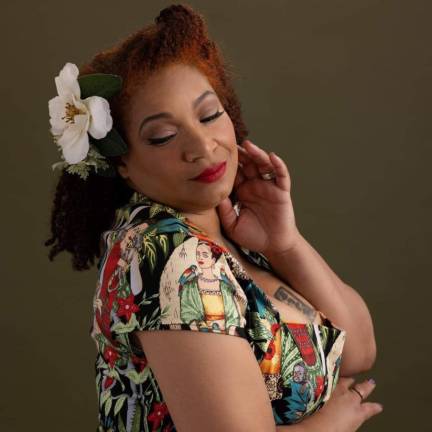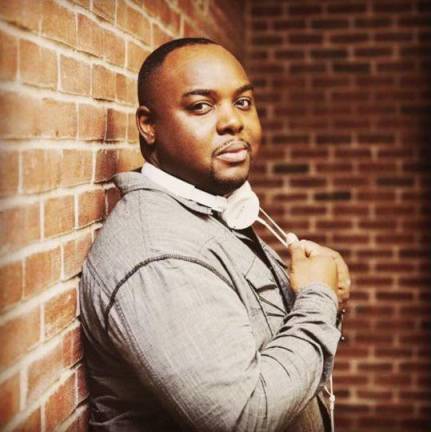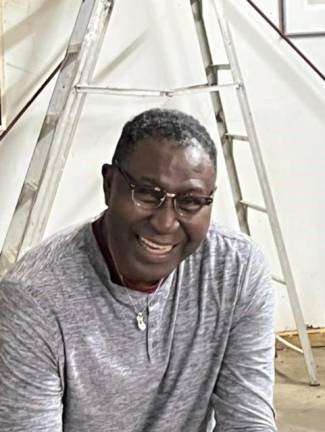Three who made Warwick’s Juneteenth distinctive
Warwick. Three Juneteenth performers provide a closer look at their personal journeys.



Warwick’s Juneteenth Celebration, hosted by the P.O.W.E.R. Collective on June 18, was a significant day for local people of color celebrating their cultures and struggles against racial inequality. The holiday moment was heightened by the speakers and performers who expressed themselves. Here are a few of their stories:
Maxwell Kofi Donkor, 63, a Greenville resident, is the lead drummer of Kofi and Sankofa Drum and Dance Ensemble, whose group capped off Juneteenth with their dance-inducing performance.
In his early life, Donkor learned drumming from his grandfather, the master drummer of his village in Ghana. In 1992, he came to America as part of an exhibition crew. Eventually they formed an ensemble that played their music around the world.
“We collaborate with people to really reach out across cultures,” Donkor explained. “We strongly believe that a lot of cultures bring us to a place where we are able to get in touch with ourselves on a spiritual level.”
Having experienced much of the world, Donkor believes the greatest classroom is travel. His passion for learning motivates him, and he hopes to continue for the rest of his life. While Donkor enjoys performing on stage, he wants to work with more schools and give students opportunities abroad.
“Giving the youth, and also adults, the opportunity to travel outside the United States makes a big, big difference,” Donkor said.
Donkor enthused about performing on Juneteenth. He sees the holiday as a chance for everyone to recognize the truth about racial oppression. “We can’t run away from it. We need to face it, and we need to try to foster communication positively. That, in the long run, will be to everybody’s benefit,” Donkor said.
Rondale Pritchett, a Middletown resident, also known as DJ RP Beats, DJ’d for this year’s Juneteenth. Motivated by his musical family and involvement in his church, Pritchett says he uses his voice to serve his community and speak out against injustice.
“We’re born into this country, so we don’t have too many choices but to be active and proactive in establishing our rights in this country. I wanted to create music that will connect people, educate, uplift, and be a positive example in our community in light of what’s going on,” Pritchett said.
He creates and performs music locally, collaborates with numerous companies, and works with children in his own after school program.
Pritchett’s music combines social commentary with personal stories, including police brutality, medical exploitation and self-help practices. He co-produces with his rap partner, Sincere Luv Da God.
“Sincere as a lyricist, his voice, our chemistry as a group, is inspiring,” Prichett said.
Describing himself as a foundational Black American who can trace his family back to American slavery, Pritchett sees Juneteenth as more than a day of remembrance, but also of recompense for those previously enslaved.
“I am a Foundational Black American, so are my family and my ancestors--the ones who actually built this country. And we should, as foundational Black Americans, receive reparations for their free labor in building this country,” Pritchett said. “The first step is acknowledgement, and the second step is repair.”
Lusia Fuentes, 50, a Village of Florida resident, was a speaker at the Juneteenth Celebration who sang and read a stream of consciousness piece. She advocates for civil rights, inspired at a young age by her family, especially her mother.
“My mother was a big influence in my life in terms of civil rights, in terms of justice for women and women of color, and people in the LGBTQAI community,” Fuentes said.
Currently, Fuentes is an attorney for three jurisdictions, including for the Family Justice Center of Morris County, NJ. She also sings and performs locally, playing roles that she finds personally touching.
“I go out for shows where, through my song, I can tell a story about who I am or make an audience feel something or realize something that maybe they didn’t see,” Fuentes said.
Her stream of consciousness, “I Know Why the Canaries Sing,” which came to her at 3 a.m. after hearing about the Roe v. Wade decision leaks, addresses her sense of hypocrisy about recent public revelations.
“Now you’re next after centuries of ignoring our songs and seeing our feathers plucked out one at a time, our hatchlings shot, hung, electrocuted, assassinated, gassed, bombed, caged, strangled and forgotten, and you want us to sing for you and yours,” Fuentes said at Juneteenth in the closing line of her stream of consciousness oration.
For Fuentes, Juneteenth is an important holiday for Black Americans who have suffered racial violence.
“We have fought anger and oppression in Warwick itself, by people, white people, telling us to shut up, sit down, take a seat. And we’re not taking that anymore,” Fuentes said. “It’s about the fact that, after hundreds of years of enslavement, we’re still here.”
I go out for shows where, through my song, I can tell a story about who I am or make an audience feel something or realize something that maybe they didn’t see.--Luisa Fuentes